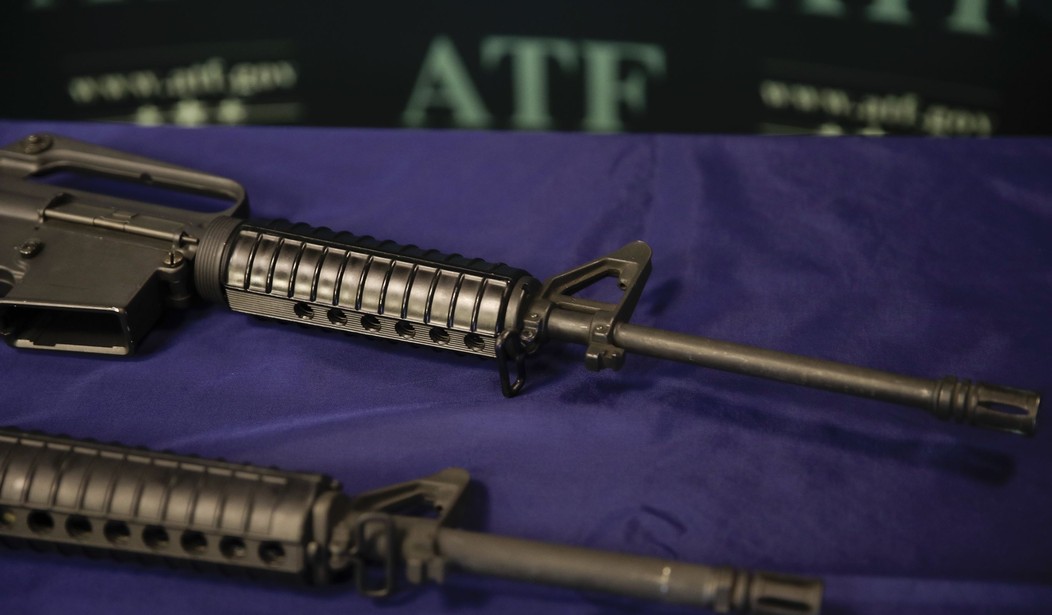Homemade firearms have been around since before this nation was a nation. They’re a way of life and have been for ages. Today, though, such firearms are called “ghost guns” and are treated like some kind of grand scourge.
It’s the pretext the Biden administration needed to step in and try to restrict these “ghost gun” kits that make it easier for law-abiding citizens to make their own guns.
And now the administration has yet another setback on that front.
The ATF can no longer enforce its unfinished-gun-parts ban against one of the foremost makers of homemade firearm kits.
Judge Reed O’Connor of the U.S. District Court for the Northern District of Texas, a George W. Bush appointee, issued a preliminary injunction on Thursday extending protections against the government’s new regulations on homemade gun parts to Defense Distributed. The ATF can no longer implement its rule in regard to the company or its customers. The judge found those rules, proposed at the request of President Joe Biden (D.), are likely unconstitutional and cause an undue burden on the parts maker.
Judge O’Connor wrote in VanDerStok v. Garland that “[t]he Government’s likely ultra vires enforcement efforts upset decades of ATF regulatory precedent against a public that has relied on that historic posture” and “the liberty interests of law-abiding citizens wishing to engage in historically lawful conduct (dealing in now-regulated parts)—which Defense Distributed shares—outweighs the Government’s competing interest in preventing prohibited persons from unlawfully possessing firearms.”
The decision adds the company, which has been at the forefront of 3D-printed, home-machined gun designs, and litigation over both for years, to a small list of other manufacturers that O’Connor has exempted from the rule. While a different federal judge previously denied an attempt by gun-rights advocates and Republican Attorneys General to have the rule blocked on Second Amendment grounds, Judge O’Connor has found Defense Distributed and the Second Amendment Foundation’s argument the ATF overstepped its authority under the Administrative Procedure Act (APA).
The ruling is another blow to President Biden’s efforts to unilaterally tighten gun regulations through ATF rulemaking rather than legislation. It comes just a few weeks after the Fifth Circuit Court of Appeals ruled the agency’s bump-stock ban violated the APA. Both decisions foreshadow potential legal troubles for Biden’s other major gun rule: the pistol-brace ban.
This, of course, is very good news, in part because each setback for the Biden administration and the ATF in the courts is a win for the Second Amendment, and not just on the “ghost gun” issue, but all of it.
Let’s make no mistake, all of these rules are, in fact, an infringement on the Second Amendment, especially in light of the Bruen decision. There is no likelihood of a late 18th-century/early 19th-century law restricting the sale of parts that could be turned into a gun, for one thing, nor does the bump stock ban conform to the NFA’s definition of a machine gun.
In all of these cases, the ATF has overstepped its authority, generally at the behest of the White House. It doesn’t matter whose butt is in the seat in the Oval Office, any infringement is unconstitutional, based on the plain text of the Second Amendment.
These more than qualified under that principle.
The downside here is that this isn’t a permanent thing. Not with “ghost guns” or any of the rest. The fight on this is far from over, which means advocates will need to gear up for additional efforts. Most of those will be in the courts, where grassroots activism will hold little sway, but the organizations challenging such laws will need support.
In time, maybe we’ll finally convince the gun control crowd that the Constitution isn’t on their side no matter how much they try to willfully misread it. Probably not, but we can dream.







Join the conversation as a VIP Member